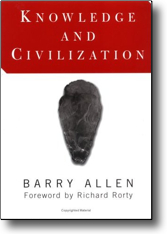When is a tool, not a tool? Apparently when it is a quasi-tool or a proto-tool. A tool provides functionless functionality. 
These were a couple of the epigramatics Barry Allen shared during a talk on technology, culture and civilization. ((Quasi-tools as I understand are objects used by beings without conscious or intelligent awareness that the object provides any particular function. Innate use of a pebble by a wasp to block the entrance to a birth chamber for example. In contrast, a proto-tool, is consciously chosen for use, but has not be fashioned to perform that function, lacking deliberate design to enable that function. A ‘tool’ per se shares two descriptive aspects: that its function is manifold and not limited by purpose, instead extended by technique to form cultural technology. Secondly, the tool is an artifact that lacks definition without having a place within an economy – that is, it has been previously linked to others in an economy of socially complimentary action (design, manufacture, sale, license, etc.) when we engage with it.))
I could not possibly do justice to philosophical reflections on the nature of a tool, so I stop there on the philosophical and refer you to my footnote, but as an economist I was particularly drawn into his discussion of the progression from first to second order machines. First order being ‘devices that extend human capacities by exploiting a mechanical advantage’ and second-order featuring ‘an assembly of first-order machines, coupled to produce a multiplying effect.’ This form of organization seemed to dovetail with a similar discussion that Allen raised about our ability to effectively fix prices, but our seeming imability to determine the true cost of a tool. His talk at this point expanded from a focus on individual artifacts to a comment on societal inability to leap the chasm between monetized value and societal impact. Engineers, Allen charged, were driven by efficiency alone in design, where recyclability could in fact be a similarly overriding design decision. My thought was that this itself could be further extended into a form of second order economy, in which we find a means to extend rather than reduce liability for design. This accepts that we are good at fixing the price, but have to find a means to determine real cost and in fact create an incentive at the outset to do so. This is not dissimilar from the overly simple and trendy concept of carbon credits we are starting to practise today. Monetization of the long-term environmental cost is a great start, but we cannot currently come to grips with the fact that progress/innovation whatever we choose to call it leads to our creation of tools with great promise by narrow analysis of immediate effect, but that have far wider consequences that we know or would care to invest in trying to discover. The idea of the unknown in our ‘first-order economy’ is something we label as risk. An economic player is called upon to find their own balance between the level of risk and what they perceive as return. The reality is that if risk is redefined to carry longer term liability for design decisions, this will force more broad exploration of wider impacts of tools at the design stage rather than in when we are trying to develop remediative responses to unintended consequences of the tool design in the future. The immediate challenge to this rethinking is the charge that it will stall innovation. My only response to this, is that we are now forced to innovate in response to unintended consequences and this may in fact demand greater costs environmental, economic or otherwise than if we chose to force earlier design decisions in the creation and application of technology.
In closing, Allen remarked on ethanol/ethane and the fact that this is one of the clearest examples of deliberate human avoidance of true cost. Getting beyond the social costs of redistribution of the harvest from the food chain into a resource for mechanical propulsion, corn is the single-most water intensive crop under cultivation. We are absolutely aware that by using it in a combustive process, the component parts are irrevocably lost to the natural cycle and yet we are clearly destroying our groundwater resources.
Allen challenges that there have never been civilizations in human history that waste tools as we do. Second-order factories are idled and having lost their opportunity are often not recombinant to another second-order machine.
